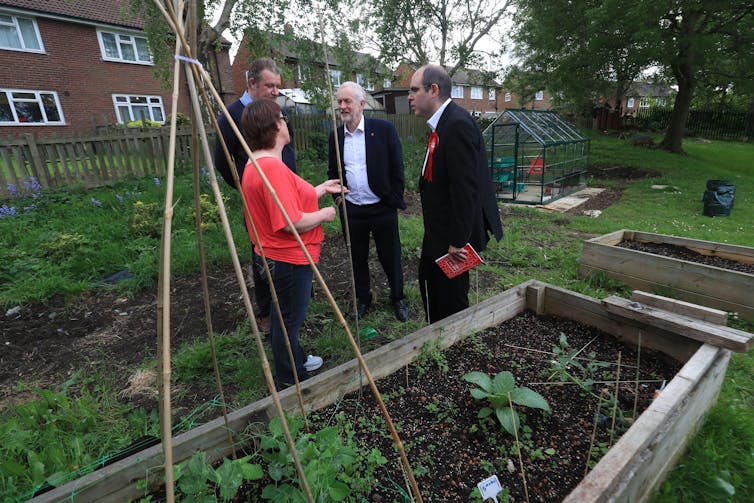Few things are as satisfying as pulling a potato from the soil with your bare hands. But in Britain’s cities this small joy – and the many health and environmental benefits that come with it – is under threat.
Recent news that the Labour government has allowed eight allotment sites across the UK to be sold off since the 2024 general election has sparked fierce criticism. Former party leader Jeremy Corbyn, an allotment grower himself, declared it “the battle for the grass roots”. And he may have a point.
Writing in the Telegraph (not usually a friendly platform for left wingers) Corbyn outlined the health, environmental and social benefits of community growing. These notions aren’t hyperbole or romanticised – they’re backed by serious evidence. Allotments have been shown to improve diets, support mental health, boost biodiversity and make cities more sustainable.
And they matter most where green space is in short supply. One in eight people have no access to a garden (that figure rises to one in five in London). The most deprived communities are often hit hardest when these spaces disappear. With around 100,000 people currently on the waiting list for allotments, the demand is clear. It’s worth asking why the UK is cutting back, instead of creating more.

Allotments in Peckham, south London. In some parts of inner London, only one in three people have a garden.
Janine Wiedel Photolibrary / Alamy
Growing your own food is good for you
People who grow their own food consume a whopping 70% more fruit and vegetables than the average person – an impressive health outcome in a nation struggling with obesity and poor diets. They also waste 95% less food, making home growing a powerful tool for both health and sustainability.
The benefits don’t end there. Studies show that older allotment growers are fitter than their peers, while spending time in community gardens is linked to better mental health and lower stress.
Urban wildlife hotspots
Allotments aren’t just good for people. They’re vital for wildlife too. A study of four UK cities found that allotments host more pollinators such as bees and hoverflies (and more species) than any other type of urban land, including nature reserves.

Allotments have lots of bee-food.
xlaura / shutterstock
At the University of Sussex, the ecologist Dave Goulson and I have demonstrated how crucial these insects are for urban food production. We worked directly with allotment growers, training them to collect data on pollinators. This had additional benefits: growers became more aware of insect diversity, they grew more bee-friendly flowers, and even took a more “inclusive” attitude towards pests like slugs. Their allotments became richer ecosystems.
The business case for allotments
The government says the decision to sell off allotments is necessary to raise funds. A spokesperson from the Ministry for Housing, Communities and Local Government said it should only happen “where it is clearly necessary and offers value for money”.

Corbyn, pictured here on the campaign trail in 2017, has long maintained an allotment in East Finchley, north London.
Danny Lawson/PA
But evidence suggests these sites already do offer value – just not in ways easily measured by a sale price. In my own city of Brighton, researchers and the local allotment federation have put a figure on the benefits: allotments are worth at least £386k a year to the city in health, wellbeing and environmental gains (around £166 per plot) – even before counting the food grown. When food is factored in, the total rises to £1.1 million annually.
These figures might be modest compared to the potential commercial value of the land but they represent a long-term investment in social and environmental benefits that are hard to replicate in a business park or housing estate.
As Corbyn pointed out, losing these spaces doesn’t just cost us money. It cuts us off from how food is grown and our connection to nature. And in the longer run, that may be a much higher price.
Cities could easily grow more food
In Sheffield, allotments make up less than 2% of the city’s available green space, yet they already produce enough fruit and veg to meet the daily needs of 3% of the city. That figure could double if just a small portion of the remaining green space suitable for allotment growing was converted.
With huge waiting lists, public demand for allotments is clear. What’s needed now is political will, and an ability to reimagine cities not just as places to live and work, but as places to grow.
Because as Corbyn warned: once these spaces are lost, they’re rarely replaced.

Don’t have time to read about climate change as much as you’d like?
Get a weekly roundup in your inbox instead. Every Wednesday, The Conversation’s environment editor writes Imagine, a short email that goes a little deeper into just one climate issue. Join the 45,000+ readers who’ve subscribed so far.


Comments are closed.